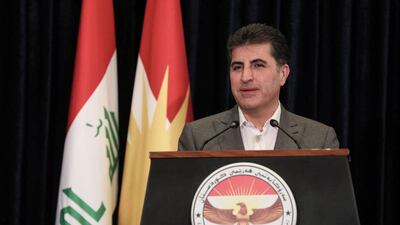The Kurdistan Region of Iraq will hold long-overdue parliamentary elections on June 10, according to a decree issued by regional presidency on Sunday.
“The decree is effective immediately, and all necessary measures must be taken from today, upon its issuance," President Nechirvan Barzani said.
The semi-autonomous region was supposed to hold parliamentary elections in October 2022, but disagreements between the major ruling parties, the Kurdistan Democratic Party and the Patriotic Union of Kurdistan, pushed back the date.
The two parties, which have a delicate power-sharing arrangement, later agreed to extend the parliament's term for a year so they could continue negotiations over issues such as amending the elections law and the sharing of tax and oil revenues.
In March last year, the Kurds set November 18 as the date of the election, but a ruling by the Supreme Federal Court two months later forced its postponement.
According to the court ruling, all decisions made by the regional parliament after its extension in October 2022 are considered null and void, including one to reactivate the region’s electoral commission to oversee the elections.
In August, authorities announced polling would take place on February 25 after consulting the parties, but the Iraqi Electoral Commission then asked for a delay, awaiting a court ruling on the region's electoral law.
Last month, Iraq's Supreme Court ruled that the Kurdistan region's parliament should have 100 members instead of 111, and that elections should be overseen by the Iraqi commission.
“All relevant parties are required to collaborate with the Independent High Electoral Commission to ensure the smooth implementation of this decision,” Mr Barzani said in the statement on Sunday.
The Kurdistan Democratic Party and the Patriotic Union of Kurdistan entered a power-sharing arrangement after the 2003 US-led invasion that toppled Saddam Hussein and paved the way for recognition of the Kurdistan Region in the 2005 constitution.
They have had disagreements over power-sharing, assassinations of PUK-linked officials and oil and gas revenue.
The KDP held 45 seats in the now-dissolved parliament, while the PUK had 21.


